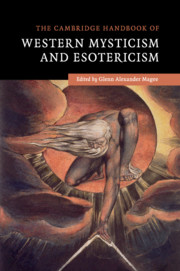Book contents
- Frontmatter
- Dedication
- Contents
- Acknowledgments
- Editor's Introduction
- List of contributors
- I ANTIQUITY
- II THE MIDDLE AGES
- III THE RENAISSANCE AND EARLY MODERNITY
- 12 Renaissance Hermetism
- 13 Christian Kabbalah
- 14 Paracelsianism
- 15 Rosicrucianism
- 16 Jacob Boehme and Christian Theosophy
- 17 Freemasonry
- 18 Swedenborg and Swedenborgianism
- 19 Mesmer and Animal Magnetism
- IV THE NINETEENTH CENTURY AND BEYOND
- V COMMON THREADS
- Suggestions for Further Reading
- Index
- References
14 - Paracelsianism
from III - THE RENAISSANCE AND EARLY MODERNITY
Published online by Cambridge University Press: 05 May 2016
- Frontmatter
- Dedication
- Contents
- Acknowledgments
- Editor's Introduction
- List of contributors
- I ANTIQUITY
- II THE MIDDLE AGES
- III THE RENAISSANCE AND EARLY MODERNITY
- 12 Renaissance Hermetism
- 13 Christian Kabbalah
- 14 Paracelsianism
- 15 Rosicrucianism
- 16 Jacob Boehme and Christian Theosophy
- 17 Freemasonry
- 18 Swedenborg and Swedenborgianism
- 19 Mesmer and Animal Magnetism
- IV THE NINETEENTH CENTURY AND BEYOND
- V COMMON THREADS
- Suggestions for Further Reading
- Index
- References
Summary
Paracelsus and Paracelsianism
Paracelsianism, although consisting of many elements and interpreted in different ways, develops from the thinking of the Swiss German physician, natural philosopher, and alchemist Philippus Areolus Theophrastus Bombastus von Hohenheim, otherwise known as Paracelsus (1493/94–1541). Following an early education that may have included instruction by his father in the transmutation of metals, Paracelsus began a “great wandering” throughout Europe that brought him into contact with both learned and artisanal communities. Around 1515, he may have received a medical degree at Ferrara, although evidence for this is sketchy. Nevertheless, Paracelsus gained a reputation as a skilled physician; his successful treatment of the well-known humanist printer Johann Froben (ca. 1460–1527) may have been partly responsible for his appointment as city physician and university lecturer at Basel. There he lectured in German, rather than Latin, and his strong criticisms of traditional medicine, which included at one point burning books, led to a hostile reaction from other university physicians and forced his abrupt departure from the city. Controversy followed wherever he went, however. Writings regarding the treatment of syphilis, in which Paracelsus recommended the use of mercury rather than medicaments made of Guajak wood, were denounced by the medical faculty at Leipzig whose dean was a close friend of the merchant family Fugger (the family that held the monopoly on the importation of the wood).
In the 1520s and 1530s, Paracelsus composed a series of texts; several of the most famous are the Archidoxis, Opus Paragranum, Opus Paramirum, Grosse Wundartzney, and the incomplete Astronomia Magna. These writings and others, most often written in vernacular German, described the bases of a new medical cosmology reviving an ancient view that connected the universe at large (the macrocosm) with the human body (the microcosm). According to Paracelsus, philosophy, astronomy, alchemy, and the virtue of the physician were the pillars that supported true medicine. The physician as philosopher and astronomer needed to recognize that “the firmament is within man” and needed also to understand how each of nature's parts was designed to correspond to specific parts of the human body. Each individual, Paracelsus claimed, contained in him- or herself all of existence, and amounted to a synthesis of physical body, immortal soul, and sidereal (or astral) spirit. The powers or virtues that operated in the world at large also operated in the body.
- Type
- Chapter
- Information
- The Cambridge Handbook of Western Mysticism and Esotericism , pp. 156 - 170Publisher: Cambridge University PressPrint publication year: 2016



